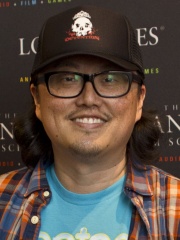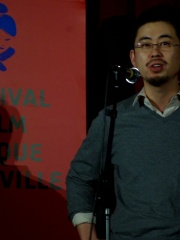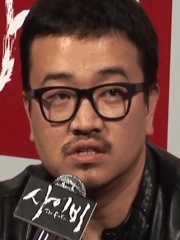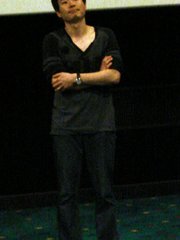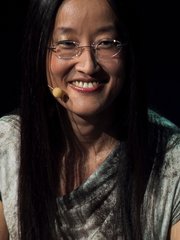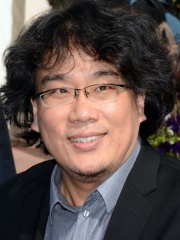
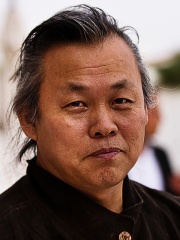
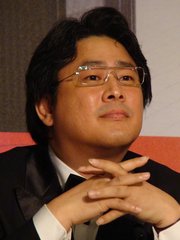
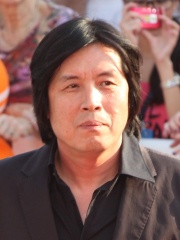
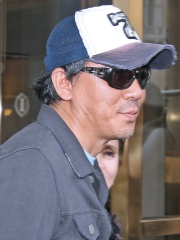
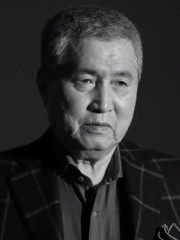
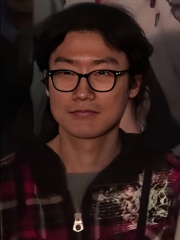
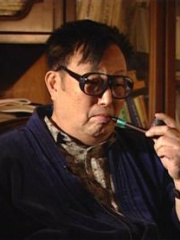
The Most Famous
FILM DIRECTORS from South Korea
This page contains a list of the greatest South Korean Film Directors. The pantheon dataset contains 2,041 Film Directors, 17 of which were born in South Korea. This makes South Korea the birth place of the 21st most number of Film Directors behind Austria, and Iran.
Top 10
The following people are considered by Pantheon to be the top 10 most legendary South Korean Film Directors of all time. This list of famous South Korean Film Directors is sorted by HPI (Historical Popularity Index), a metric that aggregates information on a biography's online popularity. Visit the rankings page to view the entire list of South Korean Film Directors.

1. Bong Joon-ho (b. 1969)
With an HPI of 70.72, Bong Joon-ho is the most famous South Korean Film Director. His biography has been translated into 56 different languages on wikipedia.
Bong Joon Ho (Korean: 봉준호; pronounced [poːŋ tɕuːnho]; born September 14, 1969) is a South Korean filmmaker. His work is characterized by emphasis on social and class themes, genre-mixing, dark comedy, and sudden tone shifts. The recipient of numerous accolades, Bong has won three Academy Awards, two British Academy Film Awards, and five Asian Film Awards. In 2017, he was included on Metacritic's list of the 25 best film directors of the 21st century, and in 2020, he was listed as one of the 100 most influential people in the world by Time and among the Bloomberg 50. Bong first became known to audiences and gained a cult following with his feature directorial debut, the dark comedy film Barking Dogs Never Bite (2000). He later achieved widespread critical success with his subsequent films: the crime thriller Memories of Murder (2003), the monster film The Host (2006), the science fiction action film Snowpiercer (2013), which served as Bong's English-language debut, and the dark comedy thriller Parasite (2019). The latter three are also among the highest-grossing films in South Korea, with Parasite being the highest-grossing South Korean film in history. All of Bong's films have been South Korean productions, although Snowpiercer, Okja (2017) and Mickey 17 (2025) are Hollywood co-productions with major use of the English language. Two of his films have screened in competition at the Cannes Film Festival—Okja in 2017 and Parasite in 2019; the latter earned the Palme d'Or, which was a first for a South Korean film. Bong won Academy Awards for Best Picture, Best Director, and Best Original Screenplay, making Parasite the first non-English language film to win Best Picture.

2. Kim Ki-duk (1960 - 2020)
With an HPI of 68.21, Kim Ki-duk is the 2nd most famous South Korean Film Director. His biography has been translated into 55 different languages.
Kim Ki-duk (Korean: 김기덕 [kim ɡidʌk̚]; 20 December 1960 – 11 December 2020) was a South Korean filmmaker, noted for his idiosyncratic art-house cinematic works. His films have received many distinctions in the festival circuit, rendering him one of the most important contemporary Asian film directors. His major festival awards include the Golden Lion at 69th Venice International Film Festival for Pietà, a Silver Lion for Best Director at 61st Venice International Film Festival for 3-Iron, a Silver Bear for Best Director at 54th Berlin International Film Festival for Samaritan Girl, and the Un Certain Regard prize at 2011 Cannes Film Festival for Arirang. His most widely known feature is Spring, Summer, Fall, Winter... and Spring (2003), included in film critic Roger Ebert's Great Movies. Two of his films served as official submissions for the Academy Award for Best International Feature Film as South Korean entries. He gave scripts to several of his former assistant directors including Juhn Jai-hong (Beautiful and Poongsan) and Jang Hoon (Rough Cut).

3. Park Chan-wook (b. 1963)
With an HPI of 63.66, Park Chan-wook is the 3rd most famous South Korean Film Director. His biography has been translated into 46 different languages.
Park Chan-wook (Korean: 박찬욱; pronounced [pak̚ tɕʰanuk̚]; born 23 August 1963) is a South Korean filmmaker and former film critic. Widely regarded as a leading figure in South Korean and 21st-century world cinema, he is known for films that blend crime, mystery, and thriller elements with other genres. His films are noted for their cinematography, framing, black humor, and often brutal subject matter. After two unsuccessful films in the 1990s which he has since largely disowned, Park came to prominence with his acclaimed third directorial effort, Joint Security Area (2000), which became the highest-grossing film in South Korean history at the time and which Park himself prefers to be regarded as his directorial debut. Using his newfound creative freedom, he would go on to direct the films forming his unofficial The Vengeance Trilogy: Sympathy for Mr. Vengeance (2002), a financial failure that polarized critics, followed by Oldboy (2003) and Lady Vengeance (2005), both of which received critical acclaim and were financially successful. Oldboy in particular is regarded as one of the greatest films ever made, and helped establish Park as a well-known director outside his native country. Most of Park's work following The Vengeance Trilogy was also commercially and critically successful both in South Korea and internationally, such as Thirst (2009), The Handmaiden (2016), which earned Park the BAFTA Award for Best Film Not in the English Language, and Decision to Leave (2022), which won the Best Director award at the 2022 Cannes Film Festival. He directed the English-language miniseries The Little Drummer Girl (2018) and The Sympathizer (2024). His 2025 film titled No Other Choice has been nominated for the Golden Globes and has been shortlisted for the Academy Awards.

4. Lee Chang-dong (b. 1954)
With an HPI of 61.10, Lee Chang-dong is the 4th most famous South Korean Film Director. His biography has been translated into 27 different languages.
Lee Chang-dong (Korean: 이창동; born July 4, 1954) is a South Korean film director, screenwriter, and novelist. He has directed six feature films: Green Fish (1997), Peppermint Candy (1999), Oasis (2002), Secret Sunshine (2007), Poetry (2010), and Burning (2018). Burning became the first Korean film to make it to the 91st Academy Awards' final nine-film shortlist for Best Foreign Language Film. Burning also won the Fipresci International Critics' Prize at the 71st Cannes Film Festival, Best Foreign Language Film in Los Angeles Film Critics Association, and Best Foreign Language Film in Toronto Film Critics Association. Lee has won Silver Lion for Best Director and Fipresci International Critics' Prize at the 2002 Venice Film Festival and the Best Screenplay Award at the 2010 Cannes Film Festival. He also won the award for Achievement in Directing at the 4th Asia Pacific Screen Awards in 2017, Jury Grand Prize at the 2018 Asia Pacific Screen Awards, Best Director and Lifetime Achievement Award at the 13th Asian Film Awards in 2019, and he has been nominated for the Golden Lion and the Palme d'Or. Lee served as South Korea's Minister of Culture and Tourism from 2003 to 2004.
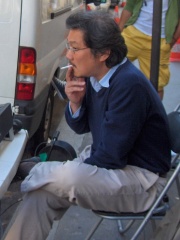
5. Hong Sang-soo (b. 1960)
With an HPI of 60.98, Hong Sang-soo is the 5th most famous South Korean Film Director. His biography has been translated into 24 different languages.
Hong Sang-soo (Korean: 홍상수; born 25 October 1960) is a South Korean film director and screenwriter. Hong creates slow-paced films about love affairs and everyday dilemmas in contemporary South Korea.

6. Kim Jee-woon (b. 1964)
With an HPI of 60.86, Kim Jee-woon is the 6th most famous South Korean Film Director. His biography has been translated into 28 different languages.
Kim Jee-woon (Korean: 김지운; born July 6, 1964) is a South Korean film director, screenwriter, and producer. He was a theater actor and director before debuting with his self-written and directed film, The Quiet Family in 1998. Kim has worked with increasing levels of success in cinema, showing accomplished acting and a detailed stylization in his films. He is currently one of the most recognized screenwriters/directors in the Korean film industry. His films A Tale of Two Sisters (2003) and A Bittersweet Life (2005) were both critical and commercial successes. He is also known for the films The Foul King (2000), The Good, the Bad, the Weird (2008), I Saw the Devil (2010), and The Age of Shadows (2016).

7. Im Kwon-taek (b. 1936)
With an HPI of 59.95, Im Kwon-taek is the 7th most famous South Korean Film Director. His biography has been translated into 16 different languages.
Im Kwon-taek (Korean: 임권택; born December 8, 1934) is one of South Korea's most renowned film directors. In an active and prolific career, his films have won many domestic and international film festival awards, as well as considerable box-office success, and helped bring international attention to the Korean film industry. As of spring 2015, he has directed 102 films.

8. Hwang Dong-hyuk (b. 1971)
With an HPI of 59.73, Hwang Dong-hyuk is the 8th most famous South Korean Film Director. His biography has been translated into 30 different languages.
Hwang Dong-hyuk (Korean: 황동혁; born May 26, 1971) is a South Korean filmmaker known for writing and directing the crime drama film Silenced (2011) and creating the Netflix survival drama series Squid Game (2021–2025). He won an Emmy for Outstanding Directing for a Drama Series in 2022 for directing the Squid Game episode "Red Light, Green Light", making him the first South Korean to win an Emmy in that category. Hwang received the Geumgwan Order of Cultural Merit, the highest decoration awarded to those who have contributed to culture and arts, in 2022.

9. Kim Ki-young (1919 - 1998)
With an HPI of 53.86, Kim Ki-young is the 9th most famous South Korean Film Director. His biography has been translated into 16 different languages.
Kim Ki-young (Korean: 김기영; October 10, 1919 – February 5, 1998) was a South Korean film director, known for his intensely psychosexual and melodramatic horror films, often focusing on the psychology of their female characters. Kim was born in Seoul during the colonial period, raised in Pyongyang, where he became interested in theater and cinema. In Korea after the end of World War II, he studied dentistry while becoming involved in the theater. During the Korean War, he made propaganda films for the United States Information Service. In 1955, he used discarded movie equipments to produce his first two films. With the success of these two films Kim formed his own production company and produced popular melodramas for the rest of the decade. Kim Ki-young's first expression of his mature style was in The Housemaid (1960), which featured a powerful femme fatale character. It is widely considered one of the best Korean films of all time. After a "Golden Age" during the 1960s, the 1970s were a low-point in the history of Korean cinema because of government censorship and a decrease in audience attendance. Nevertheless, working independently, Kim produced some of his most eccentric cinematic creations in this era. Films such as Insect Woman (1972) and Iodo (1977) were successful at the time and highly influential on the younger generations of South Korean filmmakers both at their time of release, and with their rediscovery years later. By the 1980s, Kim's popularity had declined, and his output decreased in the second half of the decade. Neglected by the mainstream during much of the 1990s, Kim became a cult figure in South Korean film Internet forums in the early 1990s. Widespread international interest in his work was stimulated by a career retrospective at the 1997 Pusan International Film Festival. He was preparing a comeback film when he and his wife were killed in a house fire in 1998. The Berlin International Film Festival gave Kim a posthumous retrospective in 1998, and the French Cinémathèque screened 18 of Kim's films, some newly rediscovered and restored, in 2006. Through the efforts of the Korean Film Council (KOFIC), previously lost films by Kim Ki-young continue to be rediscovered and restored. Many current prominent South Korean filmmakers, including directors Im Sang-soo, Bong Joon-ho and Park Chan-wook, claim Kim Ki-young as an influence on their careers.
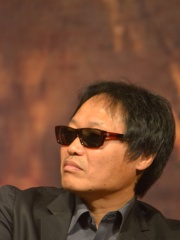
10. Kwak Jae-yong (b. 1959)
With an HPI of 52.57, Kwak Jae-yong is the 10th most famous South Korean Film Director. His biography has been translated into 16 different languages.
Kwak Jae-yong (born 22 May 1959) is a South Korean film director and screenwriter. He studied physics at Kyung Hee University. He achieved success with his debut film Watercolor Painting in a Rainy Day in 1989, but the failure of his next two movies led to eight years of unemployment before a comeback with the smash-hit film My Sassy Girl in 2001. He is known for his fondness of love stories set in a mix of different genres.
People
Pantheon has 17 people classified as South Korean film directors born between 1919 and 1988. Of these 17, 15 (88.24%) of them are still alive today. The most famous living South Korean film directors include Bong Joon-ho, Park Chan-wook, and Lee Chang-dong. The most famous deceased South Korean film directors include Kim Ki-duk, and Kim Ki-young. As of April 2024, 4 new South Korean film directors have been added to Pantheon including Park Chan-wook, Ryoo Seung-wan, and Celine Song.
Living South Korean Film Directors
Go to all RankingsBong Joon-ho
1969 - Present
HPI: 70.72
Park Chan-wook
1963 - Present
HPI: 63.66
Lee Chang-dong
1954 - Present
HPI: 61.10
Hong Sang-soo
1960 - Present
HPI: 60.98
Kim Jee-woon
1964 - Present
HPI: 60.86
Im Kwon-taek
1936 - Present
HPI: 59.95
Hwang Dong-hyuk
1971 - Present
HPI: 59.73
Kwak Jae-yong
1959 - Present
HPI: 52.57
Joseph Kahn
1972 - Present
HPI: 52.26
Lee Cheol-ha
1970 - Present
HPI: 50.96
Na Hong-jin
1974 - Present
HPI: 48.90
Yeon Sang-ho
1978 - Present
HPI: 46.85
Deceased South Korean Film Directors
Go to all RankingsNewly Added South Korean Film Directors (2025)
Go to all RankingsPark Chan-wook
1963 - Present
HPI: 63.66
Ryoo Seung-wan
1973 - Present
HPI: 45.78
Celine Song
1988 - Present
HPI: 42.36
Jennifer Yuh Nelson
1972 - Present
HPI: 40.84

